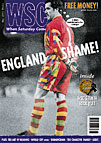 In a few weeks' time FIFA will decide whether the 2002 World Cup will go to South Korea or Japan. Jon Watts thinks that the outsiders may yet pull off a surprise
In a few weeks' time FIFA will decide whether the 2002 World Cup will go to South Korea or Japan. Jon Watts thinks that the outsiders may yet pull off a surprise
Pedigree underdogs, South Korea are at it again. The country which has almost-but-not-quite pulled off shock victories against Germany and Spain in recent World Cup finals is threatening once again to upset the odds. Competing with those economic and political heavyweights, Japan, to host 2002, South Korea started as rank outsiders, but, true to form, the contest, now entering its closing stages, is proving a lot closer than was billed.
This was not supposed to happen. If João Havelange had had his way the competition would have been over by now, with Japan the victors. Last May he tabled a proposal at FIFA’s executive committee to bring forward the final vote by six months to January this year. For Japan, whose bid started almost five years earlier than Korea’s, this would have been an enormous advantage. Not surprisingly, the Koreans were furious at this blatant attempt to blow the whistle before time. Although Havelange’s attempt was blocked and the Korean campaign regained time to make up lost ground, the “unpleasant incident”, as the Korean side euphemistically refer to it, added to the growing strains in the contest.
By September things had become so bad that politicians on both sides, fearing that historically antagonistic relations between the two neighbours were suffering, decided to go over the heads of the respective FAs. An idealistic plan was put forward: the opening match would be in Seoul, while Kobe, rebuilt after the earthquake, would host the final. “The co-hosting plan”, said its proposers, “would help to end the bad blood caused by years of colonial rule.” Alas, the Japanese Bidding Committee did not see it that way.
In the J League there are no drawn games: teams have to play on after 90 minutes until somebody wins. The same philosophy was applied to the bidding campaign. Having grafted so much harder for so much longer the Japanese side were reluctant to share the spoils – an estimated $10 billion in construction, sponsorship and marketing contracts plus the prestige of being the first country in Asia to host the World Cup finals – and told FIFA they wanted all or nothing. With Havelange also opposing it, the co-hosting option had to be aborted.
By this time, those involved with the Korean campaign were convinced that something would have to be done about Havelange if they were to have any chance. That something came last October, when Chung Moon Joon, FIFA vice president and the driving force behind the Korean bid, launched a scathing public attack on the way the Havelange administration conducted FIFA business. “Television and marketing contracts,” he claimed, “are handled by very few people behind closed doors.” Not a classic sound bite, but in FIFA speak this was revolutionary stuff.
Chung argued that compared with the Olympics, contracts for the World Cup had sold FIFA short. What he did not say, though subsequent newspaper articles filled in the gaps conveniently left, was that many of those contracts were with Japanese companies: JVC, Fuji and Canon each sponsored USA ’94 to the tune of £20 million, Sony Creative Products have exclusive marketing rights to the 1998 Finals and Dentsu control a 49% stake in ISL Worldwide, the marketing arm of FIFA.
Chung’s speech aligned him with UEFA’s Lennart Johansson and the African Federation’s Issa Hayatou, both of whom have also urged transparency in FIFA decision making. Together they represent three-fifths of the international football authorities. If Chung can mobilize this anti-Havelange grouping into an anti-Japanese vote, South Korea could yet snatch a surprise result.
Trying to seize the moral high-ground, whilst also aiming at the support of poorer football nations, Korea pledged to use their share of the profits from the World Cup (the total is estimated at £50 million) to help grass roots development of the game worldwide. Japan, by comparison, say they will only donate the profits raised by 3D virtual reality domed screens they are developing specifically for the Finals. The Korean offer may lack the technical wizardry, but they are counting on FIFA’s executive committee members opting for hard cash rather than untried technology.
Earlier this year North Korea entered the fray, declaring an interest in co-hosting the finals with their countrymen across the 38th parallel and offering the use of Pyongyang stadium, believed to be the second largest in the world with a 150,000 capacity. Football has been one of the few areas where the divided nation has come together, if only briefly, when the North and South fielded a joint team at the 1991 World Youth Championships. For FIFA executives with a sense of history, the possibility that football diplomacy might help end the last Cold War stalemate could be a temptation.
Exactly what the delegates who make up FIFA’s executive committee are thinking is anyone’s guess, but South Korean spin doctor Sung Soo Park reckons they have closed the gap. He says: “The competition is now evenly balanced and the outcome will be decide by the European vote,” adding mysteriously, “We have information that gives us confidence that we will eventually win.”
Wishful thinking or inside knowledge? We will find out on 1st June, when the twenty one members of that executive committee will make their decision. With such high expectations and so much at stake, the next few months could easily aggravate already tense relations between South Korea and Japan. The interfering politicians who wanted to settle for a draw may yet be proved right.
From WSC 111 May 1996. What was happening this month